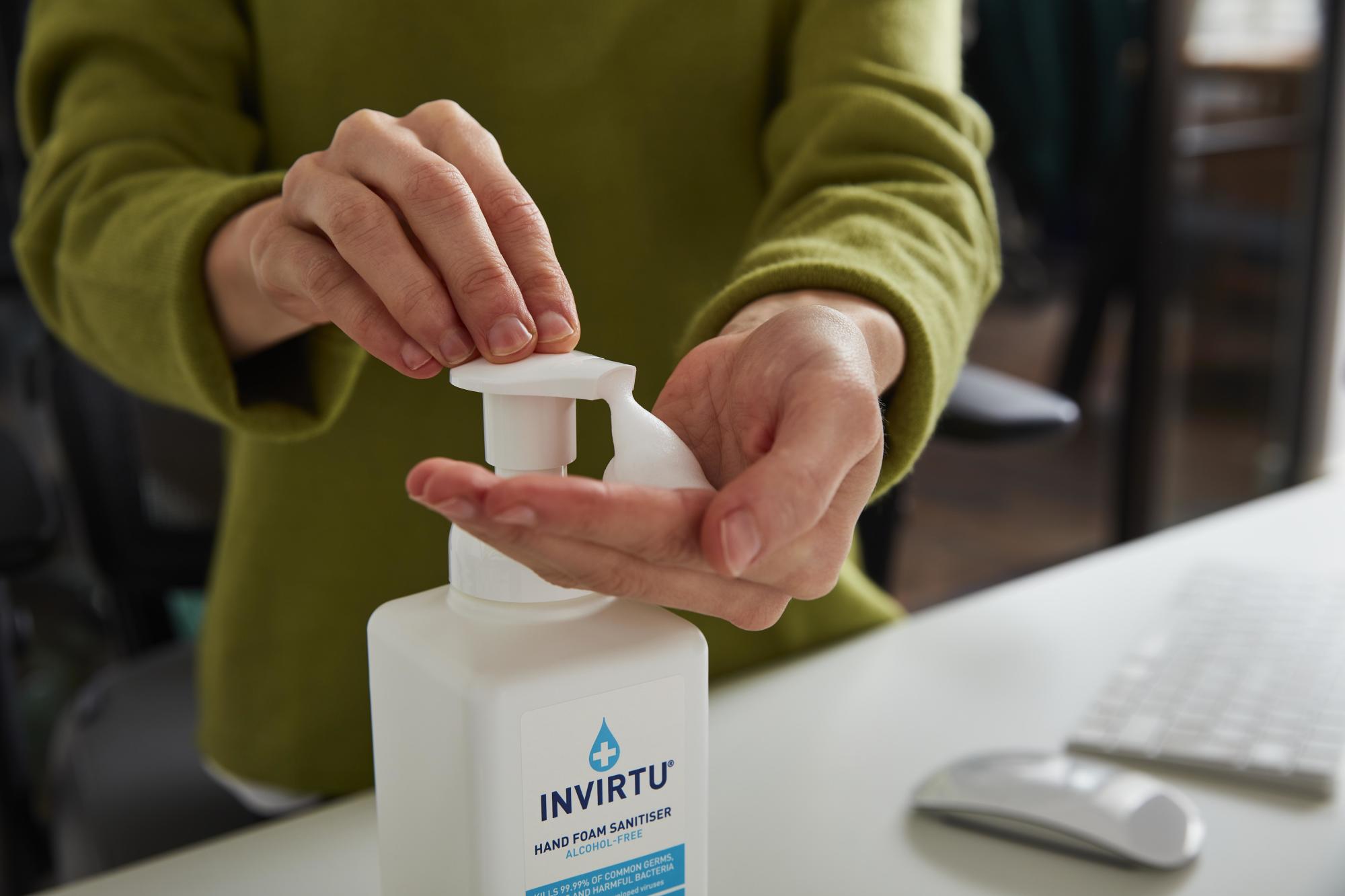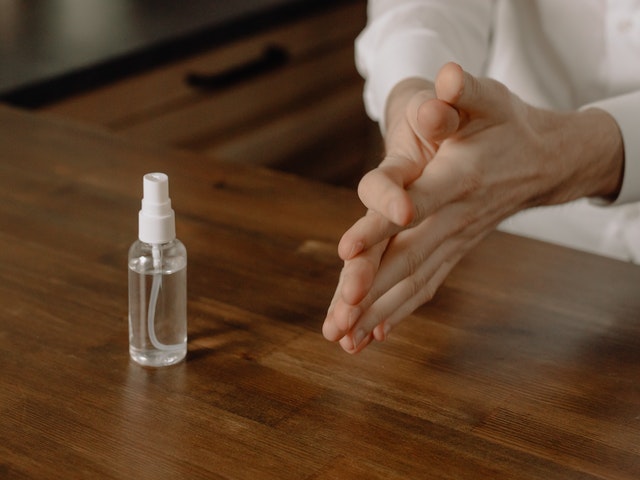World Hand Hygiene Day – Only One in Five People Wash Their Hands Correctly
Research from a smart hand sanitiser technology company shows that just one in five people cleanse their hands correctly. Additionally, 33 per...
Read Full Article
Many have been led to believe that hand sanitising solutions with high alcohol content are the safest method of stopping COVID-19 transmission, but what about the alcohol-free counterparts?
According to a study conducted in November 2020 by Rubbermaid Commercial Products, 75 per cent of people want the security of alcohol-based hand sanitiser. However, there is now a prevalence of alcohol-free alternatives on the market as we head into another year of social distancing and more stringent hygiene measures.
What is driving this demand for alcohol-free alternatives, and are they as effective?
Dr Andrew Kemp, The Head of Scientific Advisory Board at the British Institute of Cleaning Science (BICSc) and specialist in disinfection and decontamination told the Daily Express newspaper in September that we should be mindful of an over-reliance on alcohol-based hand sanitiser provisions:
“I am not aware of any hand sanitiser that has been tested against all species of bacteria. What they actually mean is that they kill 99.9 per cent of the bacterial species they tested against. At the moment there is no published proof that alcohol gels kill COVID-19 itself.
“Recent research shows the surviving bugs which are not killed by alcohol gels are themselves highly dangerous pathogens and may increase in numbers. This means our routine use of gels could ultimately cause us more harm than good.”
Alcohol-free sanitiser producer BioHygiene claims that the hand sanitiser market is saturated with harmful, unsustainable ingredients and rogue products, with their product being derived from natural and sustainable technology, whilst being 100 per cent biodegradable.
“There is a common misconception that a hand sanitiser must be alcohol-based for it to be effective, this is simply not true – there are other options available,” said Dr Carolyn Jones, Technical Director a BioHygiene.
“As many individuals will have experienced during the last few months, prolonged use of alcohol-based products can lead to dry and cracked skin, whereas our lactic acid-based sanitiser uses beauty industry technology to leave hands feeling soft and hydrated.
“Furthermore, we are beginning to see regular stories in the news of the perils of alcohol-based hand sanitisers, with high flammability being the cause of some particularly disturbing instances. The unprecedented demand has also lead manufacturers of traditional hand sanitisers to see a shortage of raw materials, including gel thickeners. This has resulted in many non-viscous products which do not cling effectively and quickly run off the hands,” said Dr Jones.

Picture: a photograph of someone using hand sanitising gel
The World Health Organisation makes a strong case for the use of alcohol in hand sanitisers, stating that “alcohol-based hand-rubs are the only known means for rapidly and effectively inactivating a wide array of potentially harmful microorganisms on hands.”
Similarly, according to Which, 60-95 per cent alcohol content is the level needed for hand gel to work to inactivate viruses, including COVID-19.
The Health and Safety Executive’s advice on hand sanitiser for workplaces does not encourage the use of any particular formula over another. Their website simply states that “there are many alcohol- and non-alcohol-based hand sanitisers and surface disinfectants available on the UK market.”
According to Byotrol plc, which makes INVIRTU alcohol-free hand sanitiser, the UK government should change the rules which deny hand sanitiser products the ability to say whether they are effective against coronavirus to help consumers.
Although the UK government has advised the general public to use hand sanitiser to combat the spread of COVID-19 when soap and water aren’t available, hand sanitisers are not permitted to make efficacy claims against specific germs, including the novel Coronavirus SARS-CoV-2 which causes COVID-19.
Unlike in Europe, the Medicines and Healthcare products Regulatory Agency (MHRA) regulations state that any hand sanitiser which makes claims against COVID-19 - or the transmission of the virus which causes it - needs to be licensed as a medicine to be sold in the UK.
Byotrol plc says that this is limiting consumers’ ability to be confident that the product they’re buying is effective. Byotrol’s Chief Technology Officer, Dr. Trevor Francis, believes the current approach is unreasonable, “There has never been a more important time to select a hand sanitiser which is proven to be effective. Many people – both professionals and consumers - are purchasing and using hand sanitiser for the first time. They simply aren’t aware of the vast differences in quality and efficacy of products on the market thanks to the censoring of product claims by the MHRA.
“Hand sanitiser is not, and never will be, a medicine. But it can be an important weapon in preventing the spread of germs and its use in a pandemic is absolutely vital.”
Prior to the pandemic, it was commonplace for hand sanitisers to list specific pathogens relevant to the sector they were used in. This gave professional users and consumers some confidence that the product they had selected would meet their individual needs. However, during the pandemic, the MHRA has policed the market more aggressively. In 2020 it determined that 341 products on the UK market were making medicinal claims relating to COVID-19 or Coronavirus and approached the 69 manufacturers to remove the claims from marketing materials.
Dr Trevor Francis explains, “What the industry needs is a sensible regulatory regime to provide consumers and professionals with clarity on which germs a product has been tested against to the proper industry-standard tests and how long it takes to work. Any confusion only serves to hinder our progress in reducing the transmission of COVID-19.”
Alcohol-free products are made to a BS EN 14476 standard, which certifies sanitiser as effective against COVID-19 if it kills a certain amount of a similar virus after being mixed with it in a test tube, however it is not tested on human hands.
A new study from researchers at Brigham Young University found that alcohol-free hand sanitiser was just as effective at disinfecting surfaces from the COVID-19 virus as alcohol-based products.
They found that benzalkonium chloride, which is commonly used in alcohol-free hand sanitisers, and several other quaternary ammonium compounds regularly found in disinfectants killed at least 99.9 per cent of the virus within 15 seconds.
Lead Study Author Benjamin Ogilvie commented: “Alcohol-free hand sanitisers, which are also effective against common cold and flu viruses, have a number of advantages over their alcohol-based counterparts.
"Benzalkonium chloride can be used in much lower concentrations and does not cause the familiar 'burn' feeling you might know from using alcohol hand sanitiser. It can make life easier for people who have to sanitize hands a lot, like healthcare workers, and maybe even increase compliance with sanitising guidelines.”
According to Byotrol plc, alcohol-free hand sanitiser INVIRTU meets the same effectiveness standards as alcohol-based hand sanitisers and comes with many more benefits. It is non-flammable, won’t cause alcohol poisoning, poses less risk of eye irritation, aligns with religious beliefs, has less risk of antibacterial resistance and is compatible with a range of gloves.
Are you recommending the use of alcohol-based hand sanitisers in your organisation? Let us know your views on Twitter or Linkedin.
Picture: a photograph of a person using INVIRTU hand sanitiser
Article written by Ella Tansley | Published 12 March 2021
Research from a smart hand sanitiser technology company shows that just one in five people cleanse their hands correctly. Additionally, 33 per...
Read Full ArticleThe safety of children and vulnerable adults could be at risk due to the wave of under-regulated alcohol-based hand sanitisers on the market. According to...
Read Full ArticleSmart hand sanitisers that can provide data on workplace hand hygiene are being trialled across the country, as part of research into how best to engage people with the...
Read Full ArticleResearch shows that many employees are less confident about their health and safety at work and more aware of hygiene practices since the pandemic began. The washroom...
Read Full ArticleINEOS Hygienics’ Swiss-engineered touchless hand sanitiser dispensers are being used throughout Tottenham Hotspur Stadium. The global healthcare brand is...
Read Full ArticleThe results of a new study show what the public expect to see when it comes to hand sanitiser provisions in public spaces in Europe. Conducted during the summer of...
Read Full ArticleDr Andrew Kemp has told a national newspaper that it’s not yet been proven that alcohol-based hand sanitiser could kill the virus that causes COVID-19 on...
Read Full ArticleBiotech innovators BioHygiene have once again bucked the trend and manufactured an accredited foam hand sanitiser that contains no alcohol or quats – taking the...
Read Full ArticleAt The Cleaning Show 2023, Kimberly-Clark Professional presented its collection of high-performance and touchless washroom dispensing systems. The ICON™...
Read Full ArticleNew nanocoatings applied to door openers on trains and buses, key pads on cash machines and door handles in doctors’ surgeries could help to stop the spread of...
Read Full Article